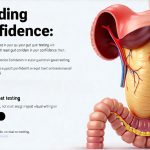Our bodies are remarkably complex systems, constantly communicating internally through a network of signals. Often, we experience intuitive feelings – “gut reactions” – that guide our decisions, influence our moods, and even impact our physical well-being. These instinctive responses are frequently dismissed as mere intuition or emotional impulses, but growing research suggests they may be deeply intertwined with the physiological state of our bodies, particularly the health of our gut microbiome and its interaction with essential nutrients. The subtle yet powerful connection between what we feel intuitively and what our bodies actually need is a burgeoning field of study, hinting at a more profound understanding of mind-body interconnectedness.
The traditional view of intuition as purely psychological is shifting as scientists uncover the intricate bi-directional communication pathway known as the gut-brain axis. This isn’t simply about physical proximity; it’s about a complex interplay involving nerves (like the vagus nerve), hormones, immune factors, and microbiota – the trillions of microorganisms living in our digestive tract. When nutritional deficiencies exist, these systems can become disrupted, potentially manifesting as altered emotional states or inexplicable anxieties that we perceive as gut reactions. This article will explore the potential links between mineral deficiency and these intuitive feelings, acknowledging the complexity of the subject and emphasizing the need for a holistic approach to health.
The Gut-Brain Axis & Mineral Roles
The gut-brain axis is essentially a two-way highway connecting your digestive system with your central nervous system. This connection isn’t just about digestion; it profoundly impacts mood, cognition, and even behavior. The microbiome, the ecosystem of bacteria residing in our gut, plays a pivotal role here. These microbes influence neurotransmitter production (like serotonin – often called the “happy hormone”), immune function, and the absorption of vital nutrients like minerals. A disturbed microbiome—often caused by poor diet, stress, or antibiotic use—can disrupt this delicate balance, potentially leading to altered emotional states and skewed perceptions. If you suspect your gut health is compromised, consider exploring how to train it for better tolerance.
Minerals aren’t just building blocks for strong bones; they are essential components in countless physiological processes crucial for neurological function. For example, magnesium is involved in over 300 enzymatic reactions in the body, including those related to nerve transmission and muscle relaxation. Zinc plays a vital role in neurotransmitter synthesis and neuronal signaling. Iron deficiency can lead to fatigue and cognitive impairment, impacting decision-making abilities. When these minerals are lacking, it’s not just physical health that suffers; mental and emotional well-being are also significantly affected. The body then sends signals – often perceived as intuition or gut feelings – attempting to alert us to the imbalance. It’s important to be aware of can intolerances leading to nutrient deficiency, which can exacerbate these imbalances.
Furthermore, mineral deficiencies can exacerbate stress responses, creating a vicious cycle. Stress depletes certain minerals (like magnesium), and mineral deficiency increases vulnerability to stress. This creates a feedback loop that can contribute to anxiety, irritability, and impaired judgment—all of which could be misinterpreted as “gut reactions.” The gut itself is highly sensitive to stress, further compounding the problem. It’s important to understand this isn’t about blaming deficiencies for emotional states, but recognizing how physiological imbalances can influence our subjective experience. Understanding are seed oils linked to gut reactions may also help identify potential triggers.
Magnesium & Emotional Regulation
Magnesium deficiency is surprisingly common and often goes undetected. Symptoms are frequently non-specific – fatigue, muscle cramps, irritability—making diagnosis challenging. However, magnesium’s role in neuronal function makes it intrinsically linked to emotional regulation. It modulates the hypothalamic-pituitary-adrenal (HPA) axis, our body’s primary stress response system. – A deficiency can lead to an overactive HPA axis, resulting in heightened anxiety and increased cortisol levels. – Magnesium also influences GABA, a neurotransmitter that promotes relaxation and reduces neuronal excitability. Low magnesium can decrease GABA production, contributing to feelings of restlessness and unease.
The link between low magnesium and intuition may be subtle but powerful. Consider the feeling of “unease” before making a decision. This isn’t always a rational assessment; it could be your body signaling a need for magnesium to support proper neuronal function and reduce stress-induced reactivity. Individuals with chronic stress are particularly vulnerable to magnesium depletion, creating a cycle where anxiety exacerbates deficiency, which further amplifies anxiety. It’s also important to note that certain medications can deplete magnesium levels, adding another layer of complexity. If you find yourself struggling with emotional regulation in relation to food intake, consider can menstrual cycles affect reactions to food?
Addressing potential magnesium deficiencies doesn’t necessarily require immediate supplementation. Prioritizing magnesium-rich foods – leafy green vegetables, nuts, seeds, dark chocolate—is a great starting point. Lifestyle factors like stress management (yoga, meditation) and adequate sleep also play a crucial role in preserving magnesium levels. If dietary changes aren’t sufficient, consulting with a healthcare professional to discuss appropriate supplementation is advisable.
Zinc & Cognitive Function
Zinc is often associated with immune function, but its importance extends far beyond that. It’s essential for brain health, playing a critical role in neurotransmitter synthesis (dopamine, serotonin), neuronal development, and synaptic plasticity—the ability of the brain to form new connections. A zinc deficiency can disrupt these processes, leading to cognitive impairment, mood disturbances, and even increased risk of depression. – Zinc is also crucial for protecting neurons from oxidative stress, a major contributor to age-related cognitive decline.
The connection between zinc deficiency and gut reactions might manifest as difficulty concentrating, impaired decision-making, or a general feeling of “brain fog.” Imagine being presented with a choice – your “gut” tells you one thing, but you struggle to articulate why. This could be indicative of a compromised cognitive process due to insufficient zinc. It’s not that your intuition is wrong; it’s that your ability to rationally assess the situation has been diminished. Furthermore, zinc deficiency can affect taste and smell, potentially leading to food aversion or altered dietary choices, further exacerbating nutritional imbalances.
Restoring adequate zinc levels typically involves a combination of dietary adjustments and potential supplementation. Oysters are famously high in zinc, but red meat, poultry, beans, and nuts also provide significant amounts. However, absorption can be inhibited by phytates found in plant-based foods. Soaking or sprouting legumes and grains can help reduce phytate content and improve zinc bioavailability. As with any supplement, it’s crucial to consult a healthcare professional before starting zinc supplementation, as excessive intake can interfere with copper absorption.
Iron Deficiency & Energy Levels
Iron is perhaps the most well-known mineral deficiency, primarily associated with anemia—a condition characterized by reduced red blood cell count and oxygen-carrying capacity. However, even subclinical iron deficiency (low iron stores without full-blown anemia) can significantly impact energy levels, cognitive function, and mood. Iron plays a vital role in mitochondrial function – the powerhouses of our cells – and is essential for neurotransmitter synthesis.
The gut reaction associated with iron deficiency might manifest as overwhelming fatigue, apathy, or a lack of motivation. This isn’t simply about feeling tired; it’s a profound sense of disconnection from your usual energy levels and interests. Imagine having an intuitive “pull” towards something but lacking the energy or enthusiasm to pursue it—this could be a signal from your body indicating iron depletion. Furthermore, iron deficiency can impair cognitive function, making it difficult to focus, remember things, or make sound judgments. This can lead to feelings of frustration and self-doubt, further diminishing motivation. When considering dietary changes, you may want to look into can sugar-free foods be more harmful?
Increasing iron intake typically involves consuming iron-rich foods such as red meat, poultry, fish, beans, lentils, and fortified cereals. Combining iron-rich foods with vitamin C enhances absorption. However, certain substances – tannins in tea and coffee—can inhibit iron absorption. Individuals at risk of iron deficiency (women during menstruation, pregnant women, vegetarians/vegans) may benefit from regular iron level checks and potential supplementation under medical guidance. It’s essential to avoid self-treating with iron supplements without proper diagnosis, as excessive intake can be harmful.
It’s crucial to remember that gut reactions are complex phenomena influenced by a multitude of factors. Mineral deficiencies are just one piece of the puzzle. Stress, emotional state, past experiences, and individual physiology all play significant roles. This exploration is not about self-diagnosing or replacing professional medical advice; it’s about fostering a greater understanding of the interconnectedness between our bodies and minds, and recognizing that seemingly intuitive feelings may sometimes be subtle signals from our physiology. A holistic approach to health—incorporating a nutrient-rich diet, stress management techniques, adequate sleep, and regular exercise—is essential for optimizing both physical and emotional well-being. Also consider what to eat when your gut is inflamed to support overall health.


















